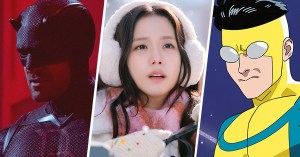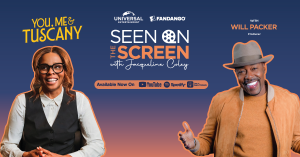Five Favorite Films with Zoe Saldana
The star of Avatar and this week's Burning Palms drops in for a chat.
Right now, Zoe Saldana is at the center of what will likely become the two biggest contemporary science fiction series on the planet. Next year she’ll reprise her role as Uhura in the sequel to J.J. Abrams’ 2009 hit Star Trek, which, if successful, will continue the invigoration of the venerable franchise. And then there are the forthcoming sequels to James Cameron’s all-time box-office king Avatar, in which Saldana proved the emotional and spiritual fulcrum as Pandora’s fearless warrior, Neytiri. Saldana invested her character’s digital exterior with a measure of soul; beneath the motion capture moved a graceful, determined performer.
In this week’s Burning Palms, an indie portmanteau comprising “five stories of madness” from Los Angeles, Saldana again proves her dramatic talent as a sexual assault victim who seeks out her attacker — with unexpected consequences. “I was intrigued,” she says of her segment, entitled “Man-Eater.” “I was really intrigued with [director] Chris Landon, because he’s so honest in terms of the arc. He wasn’t afraid to expose the artistic dark side of how life can sometimes be. One thing that really interests him is the psychological journey; why people accept things, why people react in certain ways.”
The performance is a game one, navigating some psychologically tricky terrain concerning rape. “The one thing that people don’t talk about, that sometimes happens,” Saldana explains, “is that there are women who, while they’re being raped, experience orgasm; and that is the trauma that they have to deal with — forgiving yourself in that sometimes the body can operate separate from the mind, even when going through a very traumatic encounter. It’s very complicated, and it never fully heals. It was that part of it that made me feel, as an actor, not only curious to play the part, but a responsibility to tell a story like this.”
Saldana’s tenacity — and tastes — as an actor reflect in her choice of five favorite films. The first one, in particular, was the most telling…
The Terminator (1984, 100% Tomatometer)
One movie that has always resonated with me is The Terminator. [laughs] I just loved it. Maybe it’s the fact that I was five when I saw this movie, so I was very overwhelmed by it. I felt the passion between these two individuals. I saw the strength of a woman. From the music, the robots, the technology… that movie was big because I saw it through the eyes of a five-year-old. I’m not gonna judge Terminator now that I’m 32, because obviously I’m gonna have a different take. I’ve evolved, I’ve seen different things, and life and technology and the way we see films has evolved, so it wouldn’t be fair to what Terminator represented when I was five. But that essence will never die. Terminator was very impacting for me. It really helped me a lot, to understand the kind of actor I wanted to be, and also the kind of movies and genres that I gravitate towards and absolutely love. That movie, seeing it at that age, was amazing.
RT: When you were filming with James, did you think, “Now I’m here channeling that essence of the Cameron female action hero?”
Oh my god, yes. Every day, and you’re so embarrassed to say it, you know, because obviously it’s going to make him uncomfortable. Maybe Kismet does exist: when you want something, when you’re very specific about someone you like, for some reason you set out to look for it; but at the same time, if it’s meant to be with you, it’ll come and look for you. That’s why I think that Avatar, working with Jim and calling him a friend, is something that I hold very dear and I don’t take lightly, because it’s something that was so important. Little did I know that when I was five I was gonna see a movie that would make me the kind of tough woman that I wanted to be, and make the films that I want to see. And then, 25 years later, to be working with James Cameron — it’s like, “What the f**k?”, you know?
The Hunger (1983, 44% Tomatometer)
I loved it. I thought it was such a sensual movie. I’ve always been a very curious person when it comes to sensuality and sexuality. I was raised by a mother that always taught my sisters and I that the body is not what’s tainted, it’s the mind. Therefore there was a lot flexibility; she gave us a lot of responsibility. She trusted us with things that kids aren’t supposed to be watching. My mom has a version of what censorship is, and it’s quite different to what censorship means to a lot of societies and cultures. I was very grateful for that because it taught me so much passion, and it taught me to feel okay with the human body and wanting passion and love. And The Hunger was an amazing love story. I loved the performances by Catherine Deneuve and Susan Sarandon and David Bowie.
The Goonies (1985,
63% Tomatometer)
The third one I would have to say is The Goonies. [giggles] What isn’t there about it to love? Trying to find a treasure to save your parents when you’re seeing them struggle — which f**king kid wouldn’t understand that or wanna do that, you know? [On who she identified with:] I think it was Sean Astin’s character, the little dreamer. That monologue when they’re all on the well and getting ready to go up and he’s like, “Chester Copperpot!” My sisters and I get together and we drink wine and we watch The Goonies and we quote it… “The next time we see sky, it’ll be in another town!” I love The Goonies.
Pandora’s Box (1929,
91% Tomatometer)
I think that — and it’s also related to the fifth one — growing up as a dancer I primarily learned to channel emotions through other parts of my body besides my voice, therefore when I watch silent movies I’m touched on such a deep level. To me, it was a form of acting that I gravitate towards. It’s so beautiful because it incorporates the body in such a way; your vocal chords have a great intonation but in reality it’s so much more, it’s about using the body, using the soul and all these things. So I love it. It’s such a technical movie that I learned so much from. But that’s just my approach as an actor. The storytelling was also very beautiful: the story about this box that they come to realize what’s laying in it is hope — that was a very beautiful message.
The Kid (1921, 100% Tomatometer)
For Charlie Chaplin to have the kid be this thing that kind of gives him purpose and some kind of integrity, I think that was great. It’s a very emotional and melodramatic subject and only someone like Charlie Chaplin was able to make it whimsical and funny, but also so heartfelt and sincere. So I’ve always loved The Kid. Absolute genius. I feel like he wouldn’t have gotten there if not for his vaudeville years. Every now and then I like to read up on his life as a teenager before he got to Hollywood, and the fact that he came from nothing. He came into an empire with talent. He had nothing and he had nothing to lose, therefore he gave it all. I was watching Benny and Joon last week and what Johnny Depp was doing reminded me of the essence of Chaplin: he was so light but you understood that deep down in inside of him there was this really profound and emotional man. I feel like Charlie did that with a lot of his characters.
Burning Palms is released to select theaters this week.






